|
Cycle 9 (2020 Deadline)
Renewable hydrogen generation with carbon recycling (ReHyCaRe) from biogenic residues of Bangladesh
PI: Kawnish Kirtania (kkdwip@che.buet.ac.bd), Bangladesh University of Engineering and Technology (BUET)
Co-PIs: Kazi Bayzid Kabir, BUET; Chayan Kumer Saha and Md. Monjurul Alam, Bangladesh Agriculture University (BAU); and Md. Ismail, Dhaka University
U.S. Partner: M. Toufiq Reza, Florida Institute of Technology
Project Dates: April 2021 - March 2024
Project Overview
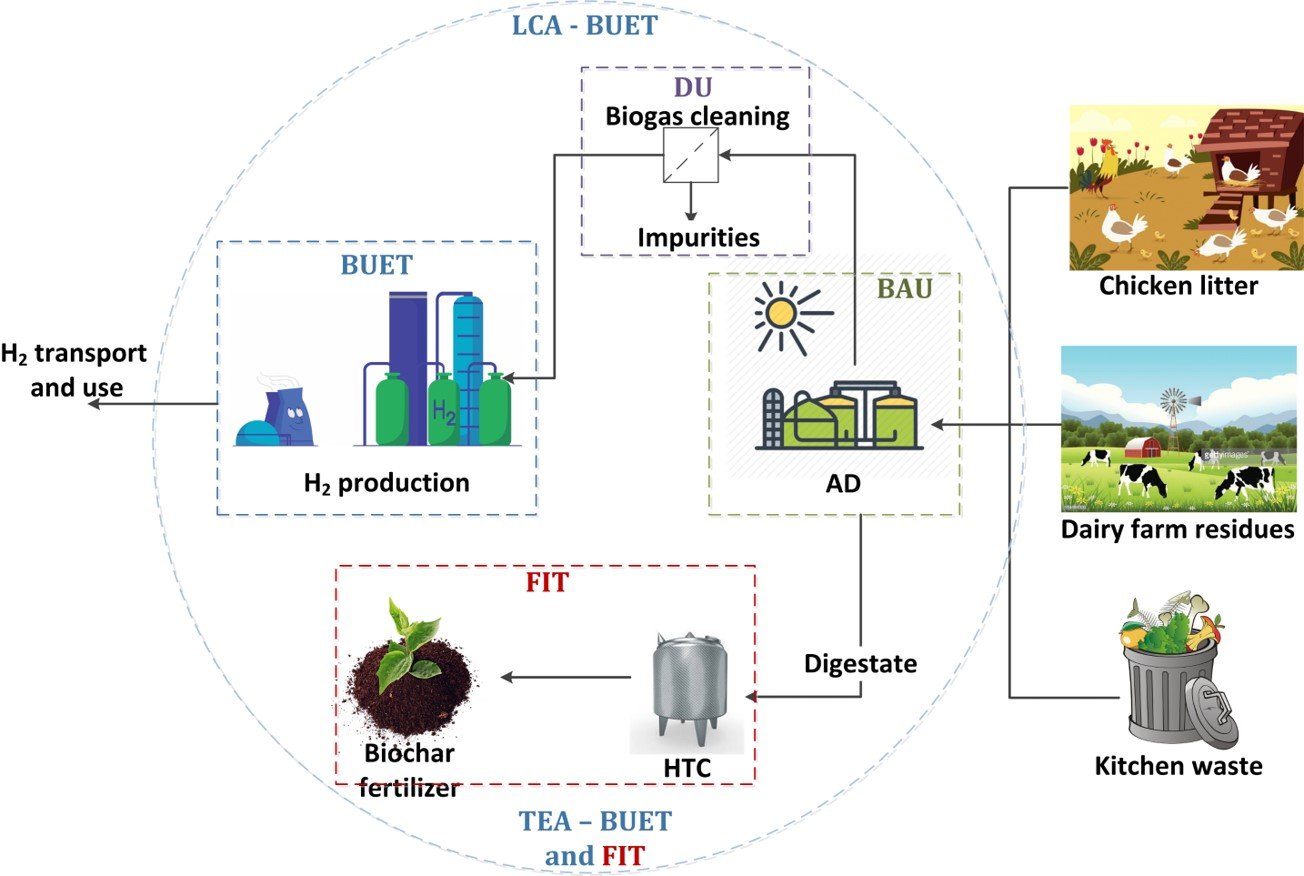 | | Multilayered project concept | 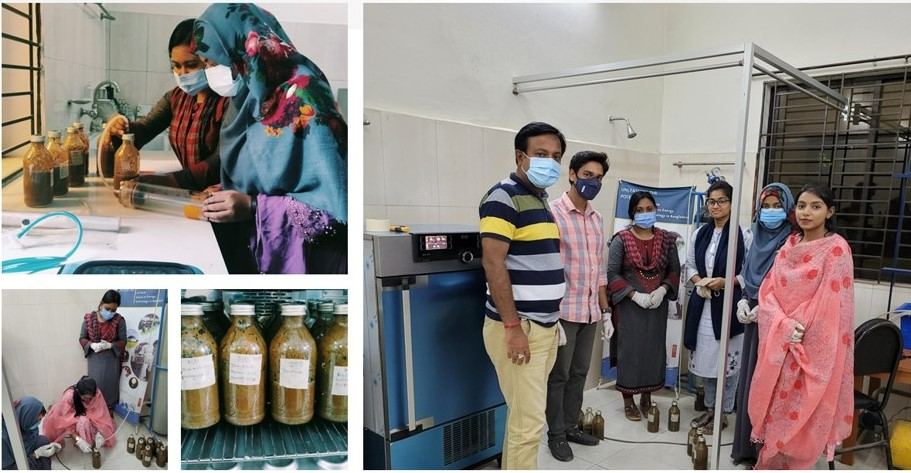 | | Experimental activities at BAU. Photo credit: Dr. Kirtania, BUET | 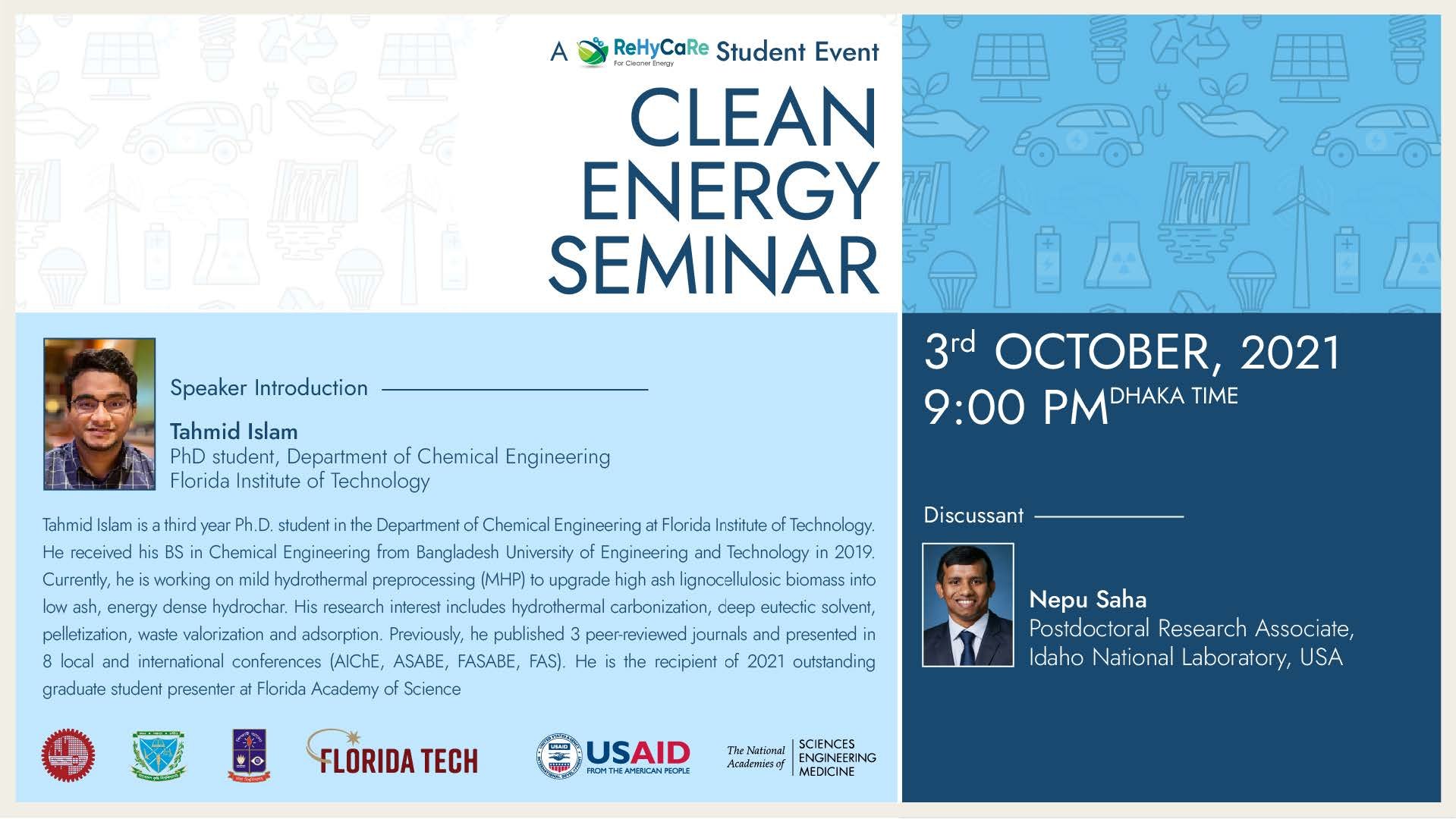 |
Bangladesh is expected to see a surge in energy demand in the upcoming years. While the country’s fossil fuel reserve has already been depleted, Bangladesh produces an enormous amount of biogenic residue that could be harnessed for hydrogen (H2) production. In order to distribute clean energy at a lower cost throughout the country, researchers believe low-risk, ready-to-deploy modular H2 generation systems hold the key to success for Bangladesh.
This PEER project proposes studying a novel process using biogenic residues for renewable H2 generation on the modular scale. This concept has been developed by three leading universities of Bangladesh (Bangladesh University of Engineering and Technology, Bangladesh Agricultural University, and Dhaka University) collaborating with partners at the Florida Institute of Technology. By converting an environmental liability (biogenic residues) into clean energy (H2), this project could aid in attaining energy security for Bangladesh. The project sought to undertake unique research and development activities focused on Bangladesh and its H2 generation potential. The ReHyCaRe concept uses anaerobic digestion on biogenic residues available to produce biogas, which will be cleaned and further upgraded to H2 with a low-cost catalyst. The project aimed to identify specific biogenic residues and their biochemical methane potentials and perform co-digestion of mixed biogenic residues to explore synergistic effects on biogas production.
Final Summary of Project Activities
The researchers undertook a life cycle assessment study on the ReHyCaRe concept (biogenic residues for green hydrogen production), which suggested a climate change reduction of 69% compared to the current practices of landfilling of biogenic wastes. The acidification potential could also be reduced by 98% and eutrophication could be reduced by 60%. A life cycle assessment for anaerobic mono-digestion and co-digestion showed that co-digestion can reduce the climate change impact by 61% compared to mono-digestion for cow manure with food waste. For poultry manure (with food waste), co-digestion resulted in 50.4% climate change impact reduction. This part of the study also revealed that proper management of digestate plays an important role on climate change impact during biogas production can be performed by hydrothermal carbonization (HTC) to produce solid biofertilizer, based on data provided by the U.S. partner.
The PEER team also conducted a scoping study on mono-digestion all available biogenic wastes in Bangladesh in an effort to select the feedstocks for existing plants for co-digestion that would maximize the conversion to biogas. The team studied co-digestion of poultry droppings with corn cobs, rice straw, rice husks, and municipal solid waste, along with studies on anaerobic co-digestion of cow dung with some of these wastes to find the optimum mixing ratios for the highest methane yield. They also tested biogas cleaning in the lab with promising results. An optimum ratio of waste iron and activated carbon (75:25) as absorbent managed to reduce the hydrogen sulfide concentration in biogas to 3 ppm. Use of activated carbon showed efficiency in CO2 removal from biogas as well.
They also demonstrated hydrogen generation using the catalytic dry reforming reactor (CADRE) in the lab and a techno-economic analysis on the hydrogen generation from biogenic waste showed a potential selling price of $8/kg with a payback period of 7 years.
This project led to an increase in capacity through procurement of a biogas reactor (BAU-CSTR) and CADRE for each institution in the PEER team and established a strong multi-university collaboration. The project trained about 25 energy professionals from three Bangladeshi universities, of whom 76% are female. PEER team members also organized eight energy seminars to disseminate knowledge to experts in the field. The team received two additional grants worth more than $35,000 for related and other work and presented widely on their findings, including at the International Conclave on Materials, Energy, and Climate and International Conference on Mechanical, Industrial, and Materials Engineering.
Publications
C.K. Saha, R. Nandi, S. Akter, S. Hossain, K.B. Kabir, K. Kirtania, T. Islam, L. Guidugli, M.T. Reza, and M.M. Alam. 2024. Technical prospects and challenges of anaerobic co-digestion in Bangladesh: A Review. Renewable and Sustainable Energy Reviews 197: 114412. https://doi.org/10.1016/j.rser.2024.114412
C.K. Saha, M.L. Khatun, J. Nime, K. Kirtania, and M.M. Alam. 2024. Co-digestion-based circular bio-economy to improve biomethane generation and production of nutrient-enriched digestate in Bangladesh. Sustainability 16(1): 104. https://doi.org/10.3390/su16010104
S. Hossain, S. Akter, C.K. Saha, T. Reza, K.B. Kabir, and K. Kirtania. 2023. A comparative life cycle assessment of anaerobic mono- and co-digestion of livestock manure in Bangladesh. Waste Management 157: 100–109. https://doi.org/10.1016/j.wasman.2022.12.011
S. Hossain, C.K. Saha, M. Ismail, T. Reza, K.B. Kabir, and K. Kirtania. 2023. Prospects and challenges of renewable hydrogen generation in Bangladesh. International Journal of Hydrogen Energy 48(54): 20588-20612. https://doi.org/10.1016/j.ijhydene.2023.03.059
M.L. Khatun, J. Nime, R. Nandi, M.A. Alam, and C.K. Saha. 2023. Co-digestion of poultry droppings and banana waste for maximizing biogas production in Bangladesh. Fuel 346: 128346. https://doi.org/10.1016/j.fuel.2023.128346
ReHyCaRe Factsheet
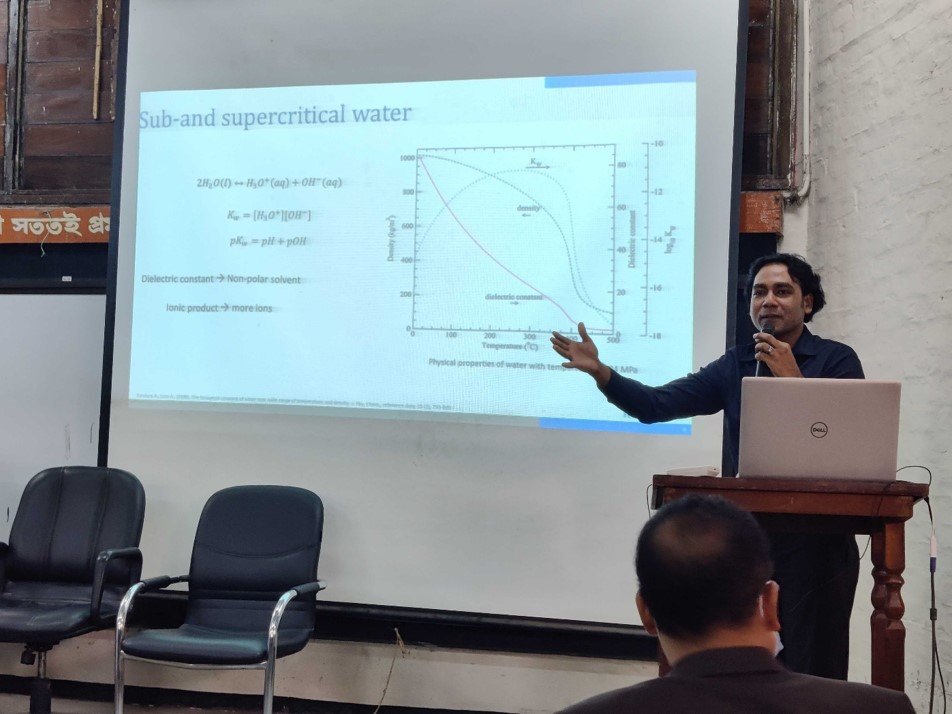 | 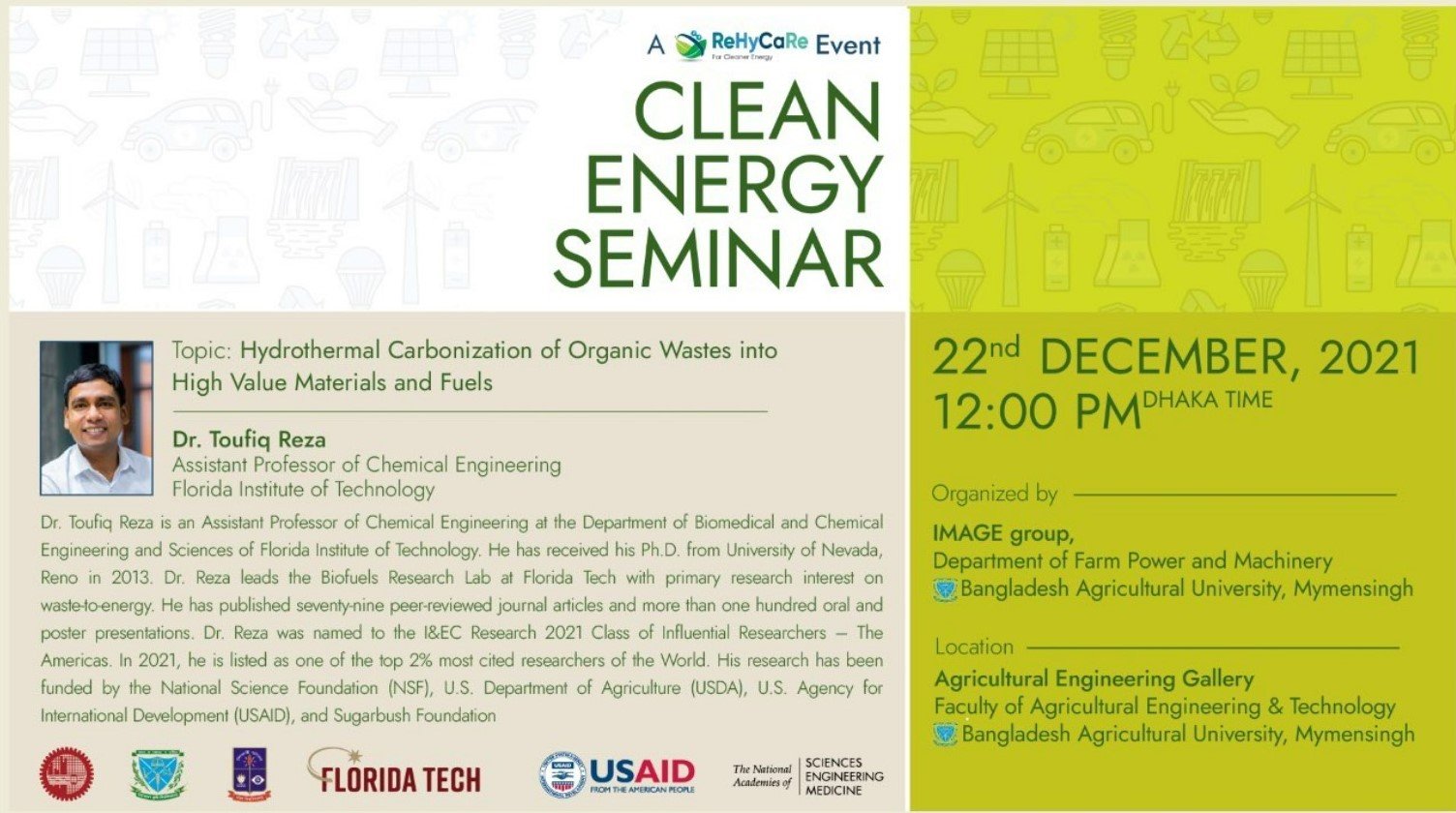 | Seminar by US Partner Dr. Toufiq Reza | |
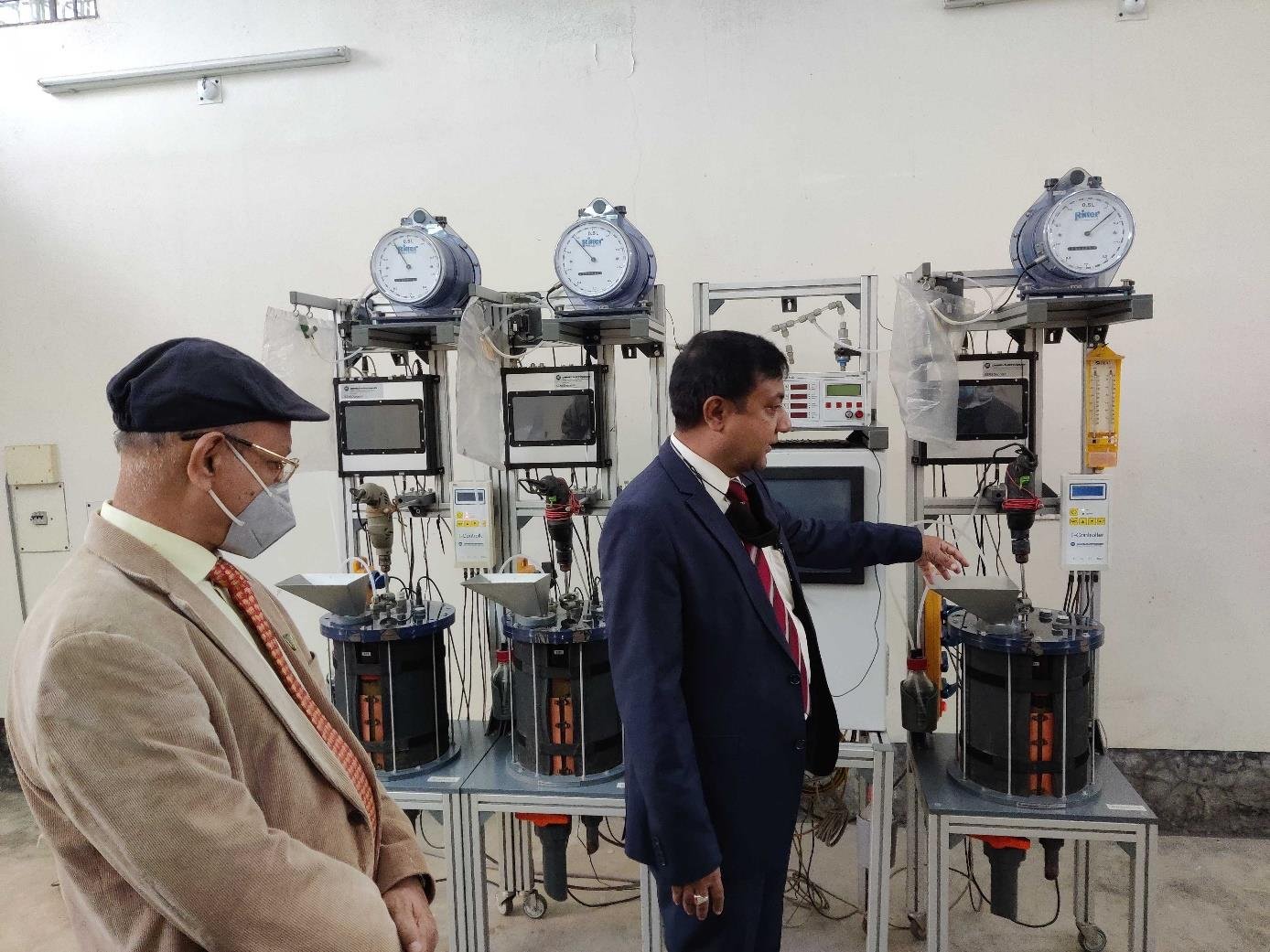 | 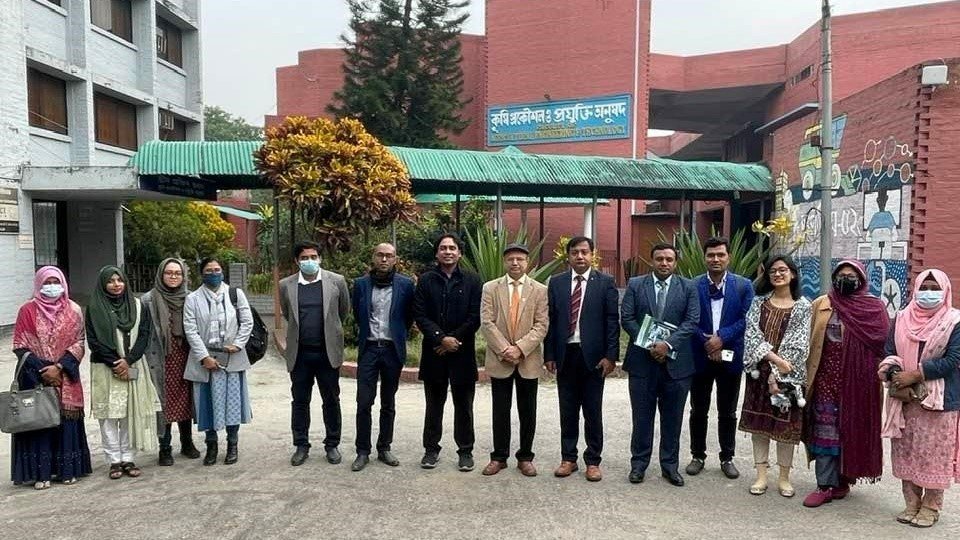 | | Visiting GEKH lab at BAU, Mymensingh | PI’s team (at BUET) and CoPI’s team (at DU) visit project CoPIs at BAU, Mymensingh, with U.S. partner Dr. Toufiq Reza (FIT), December 22, 2021 |
Back to PEER Cycle 9 Grant Recipients
|
|
|
|










